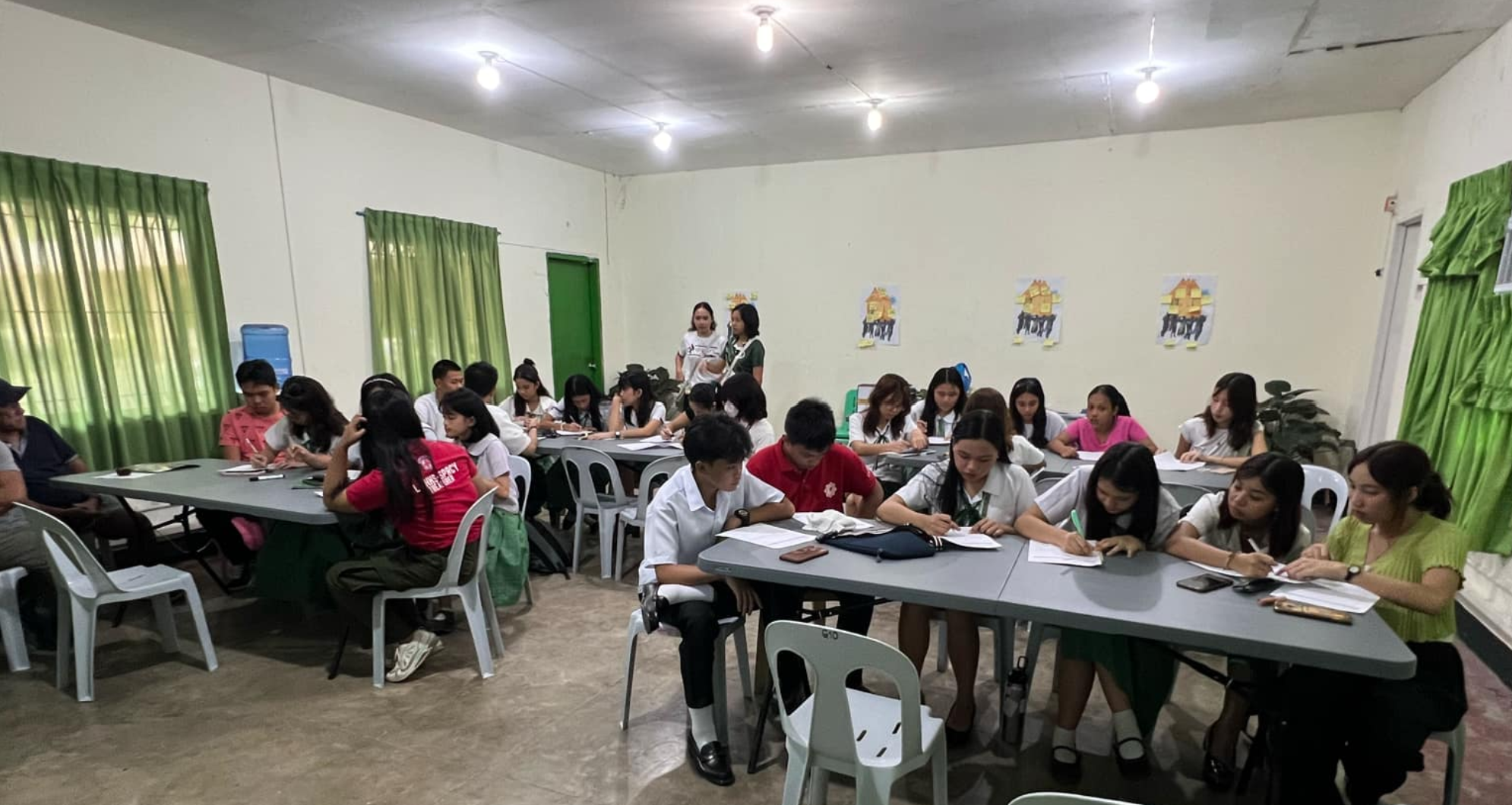
Student Spotlight
Briea Gabayoyo
Senior Intern - Strategic Engagement Team
Alumni Ambassador (Philippines)
🌏 Filipino American 📍 New Jersey / Massachusetts 🎓 Babson College
Briea Gabayoyo is a college freshman at Babson College in Wellesley, Massachusetts. She is a first-generation American, born to both parents who immigrated to America. Through high school, she was involved in leadership roles such as the Vice President of the Mental Health Club.
Through her previous Thriving Asians role as Youth Mental Health Ambassador, Briea co-facilitated events at Luisa Medel National High School in Bacolod City, Philippines - including the Returning Student Leaders Gathering, and Student Leaders Workshop.
Additionally, she served on the Thriving Filipinos Committee - providing insight to Filipino youth mental health experiences, which were elevated at the 2025 Philippine Consulate General in NY Evening with Distinguished Women in Mental Health.
Briea continues to grow her leadership at Thriving Asians - now serving as a Senior Intern. With plans to concentrate in finance in college, she aims to bridge the gap between mental health awareness and the business sphere through the Thriving Asians Internship.
Spotlight Interview
Tell us about yourself!
Since I was born, I have lived in Union, New Jersey. I was raised by two Filipino emigrants, as their first child born in America. Being that my parents were freshly from the Philippines, I have been immersed in Filipino culture and the community that was brought along with it.
But having parents who emigrated from a foreign Asian country presented struggles and barriers along the way. Filipino ideals and expectations often contrasted to the ideals of people who’s families have been established in America for multiple generations. I confided in others who had a similar background with immigrant parents in effort to not be alone in this newfound journey. But with my transition to a private high school, which had a minute Asian population, I found less people to relate to my experiences and my sense of Filipino identity began to dissipate. This drastic shift left me isolated, so I decided that there was no better way to regain this lost identity by revisiting the Philippines and taking up the opportunity to volunteer at the Home of Hope institution to truly connect through our multifaceted culture.
This trip to the Philippines completely gave me a new outlook on my culture and an immense amount of pride. I saw how despite being on complete opposite sides of the world, culture has it’s way to connect others through shared experiences brought by our heritage and traditions.
Why does Filipino/Asian mental health matter to you?
Filipino/ Asian mental health is extremely important to me because within the Asian community, mental health is often overlooked. As resilience is a staple trait of overall Asian culture, whether spanning from academics or in times of overall struggle, there’s a push to ignore any feelings of unease that are aroused from these situations. It’s often frowned upon to blame one’s setbacks on their poor mental state within our culture. Being told “it’s all in your head” or “you’re overreacting” are just some of the phrases that I’ve grown far too familiar with, leading to me bottling up emotions that should be talked about.
For these reasons, I’ve been putting my best efforts in breaking this stigma constructed within our culture and communicating that mental health isn’t something that should be ignored. Generations before us didn’t have the privilege of gaining knowledge of the importance of mental health, so I’ve made it my mission to inform those unaware to the benefits of nurturing one’s mental well-being. Maintaining our well-being factors in your success within your relationships with others, sports, academics and general quality of life.
Tell us about your experience as a Youth Mental Health Ambassador!
My journey started as a Youth Mental Health Ambassador with Thriving Asians as a junior in high school. I was first introduced to Thriving Asians by my friend, Julian Brown, who previously facilitated a workshop for the organization in the Philippines. When I mentioned my involvement as the vice president of my school’s mental health club, he thought it would be best to connect me to the organization and introduce me to the founder Michelle Garcia. Joining Thriving Asians as a Mental Health Ambassador was a seamless process as the mission that it sets forward is one that I thoroughly align with.
From then on, we organized to co-facilitate two workshops together at the Luisa Medel National High School located in the Philippines. We had a smaller refresher workshop for returning student leaders, who had previously attended a workshop the year before, which truly helped me become acclimated to the new environment that I step foot on. Then we had a larger workshop with a plethora of different students, and I saw that despite the large geographical difference between us, our culture of being Filipinos trumped all other factors. It was a truly memorable experience of connection that would not have been possible without the Thriving Asians organization.
What were some of your favorite memories or impactful moments?
My favorite memory from these experiences was seeing everyone open up and realize that we all face mental hardships within our lives. More importantly, I loved seeing everyone build a foundation of support and open-mindedness when hearing about each other’s experiences. Once they realized that they had a lot of overlaps in their mental experiences in the face of all their physical differences, a support system sprouted right in front of my eyes.
I also enjoyed connecting over simple things like snacking together and listening to music before we started the workshop. It provided a sense of ease for everyone whom I saw was a little tense, not knowing what was to come from this presentation. After this, it allowed us to engage in conversation just as I would with my friends back at home in the States.
How did the Youth Mental Health Ambassador role support you?
This Mental Health Ambassadorship helped me understand that mental health literacy is an ever expansive learning experience in which one doesn’t just reach full fulfillment, but continues to learn each day with the new experiences that life provides you. With this program, I’ve been able to carry the lessons others have learned into my own life. I’ve truly grasped the idea that I’m not in this journey of life alone and that everyone is also experiencing life for the first time. I’m more confident within myself and bringing up the importance of mental health within discussions with my fellow peers and even my family, with mental health being a foreign subject to them for most of their lives.
As a leader, this Ambassadorship has equipped me with the necessary skills needed to be successful within such a fundamental role. It has led to more open communication with the people in my life and has broken the barriers of stigma that were once ever-present. I have noticed that with my priority on my mental health, others around me also used it as motivation to prioritize their own. With a clear mindset, I have been able to excel academically, socially, and even athletically, all thanks to the lessons I’ve learned from this Ambassadorship.
What have you learned from your family, community, or culture that supports your mental health?
Something that I’ve learned from my family and my culture, which largely supports my mental health, is the power of a good meal. As nonsensical as it may sound, you cannot underestimate how much a meal can bring people together as one. It gives us the opportunity to let go of all the burdens we face, just to sit down together with our loved ones and join each other in the name of gratitude and love. Food is an essential to living and something that everyone can bond over.
How will you use your power as a role model or leader to shape a mentally healthier Filipino/Asian community?
As a role model, I will use my power to break any stigma that exists. I have developed a quality of outspokenness that I will fully utilize when communicating to others that mental health is as important as physical health. It is not something that should be taken lightly and brushed off like our past ancestors did in the name of “resilience”. True resilience is facing the issues that burden you head-on and reaching out to others with vulnerability.
Any closing reflections about your experience?
My experience was a truly unique one that I will forever hold dearly in my heart. The opportunity I was granted to interact with peers, whom I usually live 10,000 miles away from, to talk about our shared experiences was extremely heartwarming and eye opening. To this day, I still interact with the students from the workshop regularly, and it is all thanks to the impact that we made on each other
What are your favorite self-care activities?
My favorite self-care activities have to be watching movies and shows with my loved ones and reading books whenever I possibly can. It provides a temporary escape and allows me to find myself in pieces of media, helping me stay grounded.
Any shout outs to Asian/Filipino orgs, businesses, etc.?
I would like to shout out Home of Hope in Barangay Handumannan where I volunteered for a month and a half during my stay in the Philippines. Then, located back in the United states a local Filipino coffee shop named Ayala Coffee in my hometown, and my family’s business Nurturing Angels Home Care.
Project Photos
TA Youth Mental Health Leaders Session Alumni & Senior Student Meet & Greet - 12/6/2025
Philippine Consulate General in NY Annual Evening with Distinguished Women 📍 Manhattan, NY - 3/11/2025
Thriving Asians Youth Mental Health Ambassadorship Alumni Meet & Greet - 11/23/2024
Luisa Medel National High School Student Leaders Workshop 📍 Bacolod, Philippines - 7/17/2024
Luisa Medel National High School Returning Student Leaders Gathering 📍Bacolod, Philippines - 7/9/2024


















